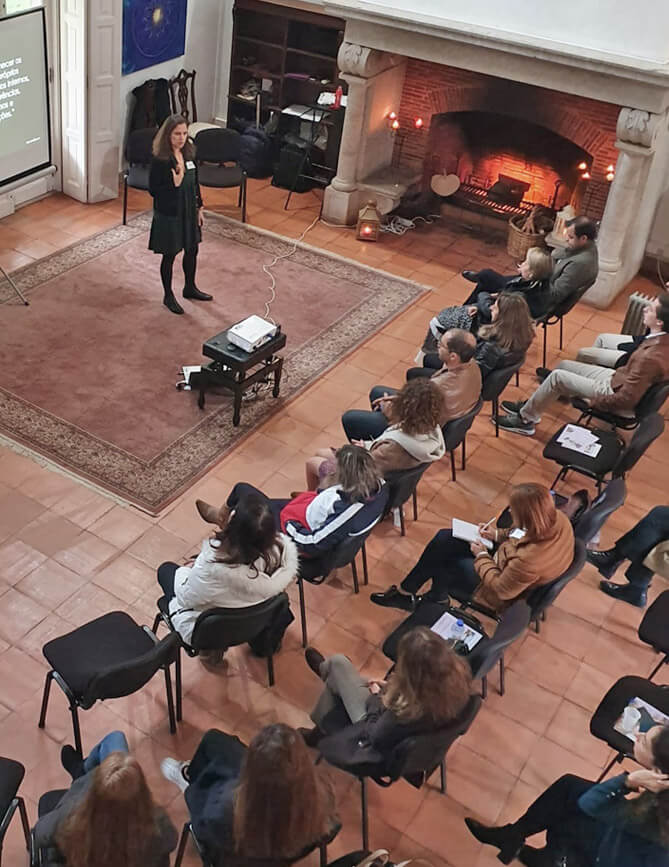What will it be like now that we are in a post-covid world? What is next? With vaccine rates on the rise, everything looks like in a process of re-opening. It is time to a re-enter in life.
This unique moment is making many of us to feel a mixture of both excitement and anxiety about returning to (a new, another version of) “normal” life. Perhaps excitement comes from the daily commute to work, in-person meetups, dinners out, family celebrations, and the feeling of connecting back with your team members at the office. On the other hand, the eventual return to the office can bring anxiety, feeling nervous about reconnecting with friends and loved ones after so long, or sadness to leave working in the comfort of home. By the way, it is important to accept that all of these can happen at the same time.
Will we remember how to be ‘human’? Will it be awkward to re-enter knowing that a surface-level conversation might not be enough after all that has happened? How will work and relationships be different after a pandemic?
The future we are shaping opens a new opportunity for authenticity and vulnerability. After so many novel and stressful experiences, this re-entry point can be a move forward towards our personal and collective growth and flourishing. Fortunately, skills like mindfulness and emotional intelligence can support us in this re-entrance, helping to reflect on what we learned and integrate the lessons as we build a new and better future.
Take it slow.
Pre-pandemic, you may have been able multiple times per week to work 8 hours at the office and then meet friends. Now, a more limited capacity for gatherings may recommend taking it slow so you re-integrate gradually without feeling overwhelmed or exhausted: take more time to rest and recharge in the evenings; invite a friend at a time for coffee. Novel experiences help your brain develop the agility required to adapt to a changing world, but too much at once can result in added stress which may lead to overwhelm.
Nevertheless, do not let the advice to “go slow” be an excuse to stay inside forever! Although Netflix may be tempting, social connection is essential to our well-being, so get out there! Just make sure to pay attention to how your body responds in social situations, and you will better manage the stress that might arise or take yourself home when rest is needed.
Take time to reflect.
Remember the early days of the pandemic: streets empty, feelings of uncertainty, and the feeling of impermanence of all things. Did you vowed to take care of your well-being or decided to spend more time with your loved ones? Pandemic has helped to illuminate what is important to us. Now, we may require space and attention to let them time to sink in.
We cannot return to the “normal” we once knew. This new reality requires us to reflect on what went well, and what still needs improvement so we can integrate the lessons learned. Over the last year, many organizations adapted to a new way of working, innovating to meet the unique demands of the challenging landscape. The future of work will include the legacy of this pandemic, like incorporating more remote work and emphasizing human-centered skills. This transitional moment asks leaders to reflect on what is most important as we build more inclusive, equitable and more “human” organizations.
Embrace change by getting curious.
Before 2020 we could not have imagined the world of quarantine, shelter-in-place orders, mask-wearing and pandemic life. And yet, we adapted and eventually found a routine. In this 2020, “navigating uncertainty” has being a top priority.
Uncertainty has always been a part of life. Our best bet is to strengthen our ability to adapt and accept changes as they come. Luckily, we can grow emotional intelligence competencies like adaptability and resilience. Additionally, mindfulness is a driver for curiosity—it helps you manage stress which builds resilience and opens the mental space for curiosity, creativity and innovation.
Do not forget our common humanity.
The COVID-19 pandemic revealed that we are more intimately connected than we could have imagined. As we rebuild more equitable workplaces and communities, empathy will play a key role in integrating the lessons of this last year and a half. Recollecting this shared experience can help us strengthen empathy by reminding us that we are all human, worthy of health, dignity, and respect.
NOTE: This article is an adaptation of the post “Tips for Transitioning to Life After a Pandemic” available at https://siyli.org/life-after-a-pandemic/

